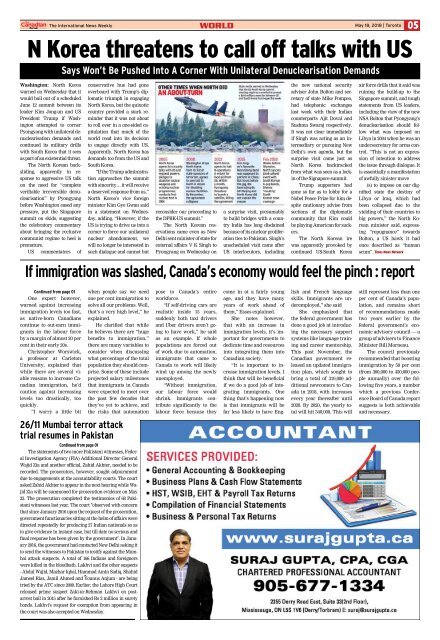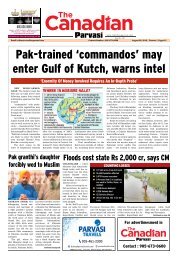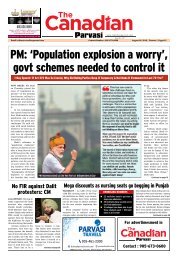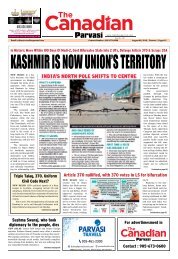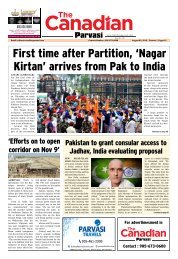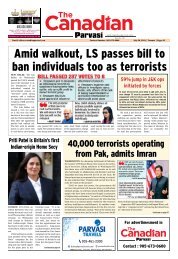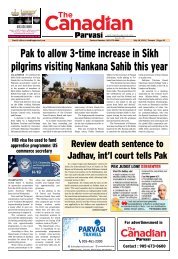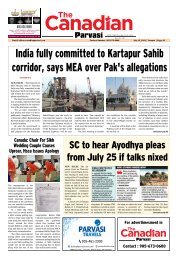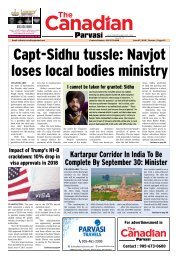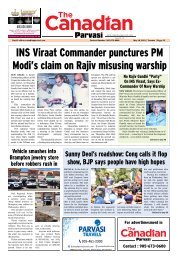The Canadian Parvasi - Issue 46
Create successful ePaper yourself
Turn your PDF publications into a flip-book with our unique Google optimized e-Paper software.
<strong>The</strong> International News Weekly World<br />
05<br />
May 18, 2018 | Toronto<br />
N Korea threatens to call off talks with US<br />
Says Won’t Be Pushed Into A Corner With Unilateral Denuclearisation Demands<br />
Washington: North Korea<br />
warned on Wednesday that it<br />
would bail out of a scheduled<br />
June 12 summit between its<br />
leader Kim Jong-un and US<br />
President Trump if Washington<br />
attempted to corner<br />
Pyongyang with unilateral denuclearisation<br />
demands and<br />
continued its military drills<br />
with South Korea that it sees<br />
as part of an existential threat.<br />
<strong>The</strong> North Korean backsliding,<br />
apparently in response<br />
to aggressive US talk<br />
on the need for “complete<br />
verifiable irreversible denuclearisation”<br />
by Pyongyang<br />
before Washington eased any<br />
pressure, put the Singapore<br />
summit on skids, suggesting<br />
the celebratory commentary<br />
about bringing the reclusive<br />
communist regime to heel is<br />
premature.<br />
US commentators of<br />
conservative hue had gone<br />
overboard with Trump’s diplomatic<br />
triumph in engaging<br />
North Korea, but the quixotic<br />
country provided a stark reminder<br />
that it was not about<br />
to roll over in a one-sided capitulation<br />
that much of the<br />
world read into its decision<br />
to engage directly with US.<br />
Apparently, North Korea has<br />
demands too from the US and<br />
South Korea.<br />
“If the Trump administration<br />
approaches the summit<br />
with sincerity… it will receive<br />
a deserved response from us,”<br />
North Korea’s vice foreign<br />
minister Kim Gye Gwan said<br />
in a statement on Wednesday,<br />
adding, “However, if the<br />
US is trying to drive us into a<br />
corner to force our unilateral<br />
nuclear abandonment, we<br />
will no longer be interested in<br />
such dialogue and cannot but<br />
reconsider our proceeding to<br />
the DPRK-US summit.”<br />
<strong>The</strong> North Korean reservations<br />
came even as New<br />
Delhi sent minister of state for<br />
external affairs V K Singh to<br />
Pyongyang on Wednesday on<br />
a surprise visit, presumably<br />
to build bridges with a country<br />
India has long disdained<br />
because of its nuclear proliferation<br />
ties to Pakistan. Singh’s<br />
unscheduled visit came after<br />
US interlocutors, including<br />
the new national security<br />
adviser John Bolton and secretary<br />
of state Mike Pompeo,<br />
had telephonic exchanges<br />
last week with their Indian<br />
counterparts Ajit Doval and<br />
Sushma Swaraj respectively.<br />
It was not clear immediately<br />
if Singh was acting as an intermediary<br />
or pursuing New<br />
Delhi’s own agenda, but the<br />
surprise visit came just as<br />
North Korea backtracked<br />
from what was seen as a lockin<br />
of the Signapore summit.<br />
Trump supporters had<br />
gone so far as to lobby for a<br />
Nobel Peace Prize for him despite<br />
cautionary advise from<br />
sections of the diplomatic<br />
community that Kim could<br />
be playing American for suckers.<br />
<strong>The</strong> North Korean ire<br />
was apparently provoked by<br />
continued US-South Korea<br />
air force drills that it said was<br />
ruining the build-up to the<br />
Singapore summit, and tough<br />
statements from US leaders,<br />
including the view of the new<br />
NSA Bolton that Pyongyang’s<br />
denuclearisation should follow<br />
what was imposed on<br />
Libya in 2004 when he was an<br />
undersecretary for arms control.<br />
“This is not an expression<br />
of intention to address<br />
the issue through dialogue. It<br />
is essentially a manifestation<br />
of awfully sinister move<br />
(s) to impose on our dignified<br />
state the destiny of<br />
Libya or Iraq, which had<br />
been collapsed due to the<br />
yielding of their countries to<br />
big powers,” the North Korean<br />
minister said, expressing<br />
“repugnance” towards<br />
Bolton, a US hawk it had<br />
once described as “human<br />
scum”. Times News Network<br />
If immigration was slashed, Canada’s economy would feel the pinch : report<br />
Continued from page 01<br />
One expert however,<br />
warned against increasing<br />
immigration levels too fast,<br />
as native-born <strong>Canadian</strong>s<br />
continue to out-earn immigrants<br />
in the labour force<br />
by a margin of almost 20 per<br />
cent in their early 20s.<br />
Christopher Worswick,<br />
a professor at Carleton<br />
University, explained that<br />
while there are several viable<br />
reasons to increase <strong>Canadian</strong><br />
immigration, he’d<br />
caution against increasing<br />
levels too drastically, too<br />
quickly.<br />
“I worry a little bit<br />
when people say we need<br />
one per cent immigration to<br />
solve all our problems. Well,<br />
that’s a very high level,” he<br />
explained.<br />
He clarified that while<br />
he believes there are “huge<br />
benefits to immigration,”<br />
there are many variables to<br />
consider when discussing<br />
what percentage of the total<br />
population they should comprise.<br />
Some of these include<br />
projected salary milestones<br />
that immigrants in Canada<br />
were expected to meet over<br />
the past few decades that<br />
they’ve yet to achieve, and<br />
the risks that automation<br />
pose to Canada’s entire<br />
workforce.<br />
“If self-driving cars are<br />
realistic inside 15 years,<br />
suddenly both taxi drivers<br />
and Uber drivers aren’t going<br />
to have work,” he said<br />
as an example. If whole<br />
populations are forced out<br />
of work due to automation,<br />
immigrants that came to<br />
Canada to work will likely<br />
wind up among the newly<br />
unemployed.<br />
“Without immigration,<br />
our labour force would<br />
shrink. Immigrants contribute<br />
significantly to the<br />
labour force because they<br />
come in at a fairly young<br />
age, and they have many<br />
years of work ahead of<br />
them,” Esses explained.<br />
She notes however,<br />
that with an increase in<br />
immigration levels, it’s important<br />
for governments to<br />
dedicate time and resources<br />
into integrating them into<br />
<strong>Canadian</strong> society.<br />
“It is important to increase<br />
immigration levels. I<br />
think that will be beneficial<br />
if we do a good job of integrating<br />
immigrants. One<br />
thing that’s happening now<br />
is that immigrants will be<br />
far less likely to have English<br />
and French language<br />
skills. Immigrants are underemployed,”<br />
she said<br />
She emphasized that<br />
the federal government has<br />
done a good job at introducing<br />
the necessary support<br />
systems like language training<br />
and career mentorship.<br />
This past November, the<br />
<strong>Canadian</strong> government released<br />
an updated immigration<br />
plan, which sought to<br />
bring a total of 310,000 additional<br />
newcomers to Canada<br />
in 2018, with increases<br />
every year thereafter until<br />
2020. By 2020, the yearly total<br />
will hit 340,000. This will<br />
still represent less than one<br />
per cent of Canada’s population,<br />
and remains short<br />
of recommendations made<br />
two years earlier by the<br />
federal government’s economic<br />
advisory council — a<br />
group of advisers to Finance<br />
Minister Bill Morneau.<br />
<strong>The</strong> council previously<br />
recommended that boosting<br />
immigration by 50 per cent<br />
(from 300,000 to 450,000 people<br />
annually) over the following<br />
five years, a number<br />
which a previous Conference<br />
Board of Canada report<br />
suggests is both achievable<br />
and necessary.<br />
26/11 Mumbai terror attack<br />
trial resumes in Pakistan<br />
Continued from page 01<br />
<strong>The</strong> statements of two more Pakistani witnesses, Federal<br />
Investigation Agency (FIA) Additional Director General<br />
Wajid Zia and another official, Zahid Akhter, needed to be<br />
recorded. <strong>The</strong> prosecutors, however, sought adjournment<br />
due to engagements at the accountability courts. <strong>The</strong> court<br />
asked Zahid Akhter to appear in the next hearing while Wajid<br />
Zia will be summoned for prosecution evidence on May<br />
23. <strong>The</strong> prosecution completed the testimonies of 68 Pakistani<br />
witnesses last year. <strong>The</strong> court "observed with concern<br />
that since January 2016 upon the request of the prosecution,<br />
government functionaries sitting at the helm of affairs were<br />
directed repeatedly for producing 27 Indian nationals so as<br />
to give evidence in instant case, but till date no serious and<br />
final response has been given by the government". In January<br />
2016, the government had contacted New Delhi asking it<br />
to send the witnesses to Pakistan to testify against the Mumbai<br />
attack suspects. A total of 166 Indians and foreigners<br />
were killed in the bloodbath. Lakhvi and the other suspects<br />
- Abdul Wajid, Mazhar Iqbal, Hammad Amin Sadiq, Shahid<br />
Jameel Riaz, Jamil Ahmed and Younus Anjum - are being<br />
tried by the ATC since 2009. Earlier, the Lahore High Court<br />
released prime suspect Zaki-ur-Rehman Lakhvi on postarrest<br />
bail in 2015 after he furnished Rs 2 million in surety<br />
bonds. Lakhvi's request for exemption from appearing in<br />
the court was also accepted on Wednesday.


